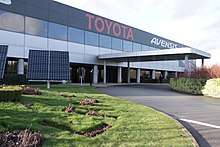Toyota Manufacturing UK
Toyota Motor Manufacturing (UK) Ltd is the manufacturing operation of Toyota in the United Kingdom, established in December 1989.
 | |
| Subsidiary | |
| Industry | Automotive |
| Genre | Motor cars |
| Founded | December 1989 |
| Headquarters | , England |
Key people |
|
| Products | Automobiles |
Number of employees | 3,800 |
| Parent | Toyota Motor Corporation |
| Website | www |
Burnaston plant
The vehicle manufacturing plant at Burnaston, Derbyshire, assembles cars. On 16 December 1992, the first car rolled off the production line, which was a Carina E.
Since then, production has included Avensis, Corolla, and Auris models. An engine manufacturing factory is located on Deeside, North Wales.[1] As of September 2016, the two factories employ 3,800 staff. The processes at Burnaston include stamping (pressing panels from rolls of steel), welding, painting, plastic mouldings (bumpers and instrument panels/dashboards) and assembly and at Deeside machining, assembly and aluminium casting.[2]
On 26 February 2007, Gordon Brown, the then chancellor, visited the Burnaston facility, to celebrate the official launch of the Auris in the United Kingdom. TMUK used the occasion to announce an investment of GB£100 million in its Deeside factory, to build a petrol engine for the Auris.[3] Four months later, Brown would become Prime Minister.
Initial reporting on the engine called it a hybrid, and it was expected to be used as part of a system known as Hybrid Synergy Drive.
At its fastest speed, a car can come off the end of the production line approximately every sixty seconds. Toyota Manufacturing UK, in partnership with Rapid Electronics, organise the Toyota Technology Challenge, a national engineering and technology competition, which is aimed at secondary schools within the United Kingdom.[4]
Burnaston produced 180,425 cars in 2016, which represented a 5.1% decline on the previous year's figure.[5] In March 2018, it was reported that the plant was operating at 50% of its theoretical full three shift capacity.[6] Toyota fears a no deal Brexit would halt production at Burnaston for an unpredictable length of time, because the plant is heavily dependent on components imported from the European Union.
Marvin Cooke, director of the Burnaston plant fears for the long term future of the plant too. Cooke said, "In the longer term the burden of import and export costs would add permanent costs to our business, it would reduce our competitiveness. Sadly, that would reduce the number of cars made in the United Kingdom and that would cost jobs."[7]
Current cars manufactured at Toyota Manufacturing UK
- Toyota Corolla (E210) (2018–present)
Former cars manufactured at Toyota Manufacturing UK
- Toyota Carina E (1992–1997)
- Toyota Avensis (1997–2018)
- Toyota Corolla (1997–2007)
- Toyota Auris (2006–2018)
- Toyota Auris Hybrid (2010–2018)
References
- "A Welsh success story we can all be proud of". ITV News. 10 September 2012. Retrieved 31 August 2014.
- Toyota Manufacturing UK. "The Facts". Retrieved 10 March 2007.
- "Toyota £100m safeguards 200 jobs". BBC. 26 February 2007. Retrieved 26 February 2007.
- "Toyota Technology Challenge". UK: Rapid Electronics. Archived from the original on 21 June 2008. Retrieved 2 January 2017.
- "17 year high for British car manufacturing as global demand hits record levels". The Society of Motor Manufacturers and Traders (SMMT), London. 26 January 2017. Retrieved 11 September 2018.
- Robert Lea, Industrial Editor (1 March 2018). "Toyota to build new Auris in Britain". The Times, London. Retrieved 11 September 2018.
- Toyota says no-deal Brexit would stall production at Burnaston BBC
